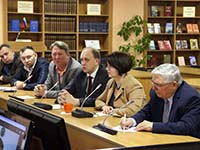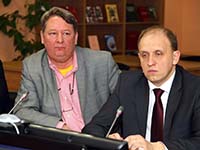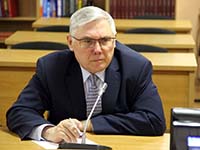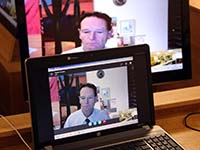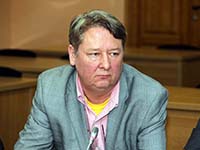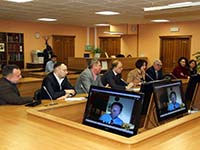ASU scientists discussed plans for the future with American partners
Famous American scientist, specialist in early immunological detection and preventive treatment of cancer, immunologist, professor of Arizona State University (USA) Stephen Johnston made a contact with Altai State University via Skype. Chief Physician of Altai Regional Oncologic Dispensary, Honoured Doctor of Russian Federation, Head of the Department of Oncology of Altai State Medical University, Doctor of Medical Sciences, Professor Alexander F. Lazarev also joined the meeting.
Plans for joint work in 2017 were established in the course of event. It primarily concerned elaboration of immunosignature technology for early breast cancer detection. According to Executive Director of Russian-American Anti-Cancer Center, Candidate of Biology Andrey I. Shapoval, scientists of the center are currently proceeding to comparative analysis of blood samples collected in Duke University (Durhan, North Carolina, United States), Great Britain and Altai Regional Oncologic Dispensary.
“Firstly, our aim is to test the work of this experimental system in different laboratories of the world and find out how multipurpose and easy-to-operate the immunosignature technology is. Secondly, we are going to figure out whether there are differences between immunosignatures of patients from the United States of America, Great Britain and Russia and or not, whether there is a universal immunisignature or we should develop regional immunosignatures for every medical case,” explained Andrey Shapoval.
Russian and American scientists also noted that there is a problem with moving from scientific research of immunosignature to the clinical phase.
“We understand that it is complicated, but clinicians want to get specific results of our work. I suggested that we should concentrate on one issue and study it more thoroughly. For example, breast or lung cancer is an absolutely reasonable topic for research, which Anti-Cancer Center of Altai State University has already started to work on. These health problems are the most common and problematic. Moreover, they are easy to monitor, because a lot of control methods have already been developed,” said Alexander F. Lazarev. “We will continue to collect and analyze material. However, I will only be satisfied with our joint work, if we switch to practice. We will discuss these questions with Professor Johnston, when he comes to Barnaul. Unfortunately, now we have a limited number of microchips to work with immunosignature. The reason for this problem is lack of funding. Still we are going to develop this immunosignature project, because there are not that many other breakthroughs in oncology for the moment.”
Professor Johnston expressed his confidence in the fact that the long-drawn research in immunosignature will be justified eventually, because all the work carried out by scientists of Altai State University and Arizona State University and doctors of Altai Regional Oncologic Dispensary is groundbreaking in terms of oncology development.
Alexander F. Lazarev emphasized that collaboration between Altai Regional Oncologic Dispensary, Russian-American Anti-Cancer Center and Arizona State University is an effectively operating mechanism. He also invited Professor Johnston to participate in All-Russian Conference under the auspices of Russian Oncologists Association, which will take place in Barnaul on 23–24 August 2017.
